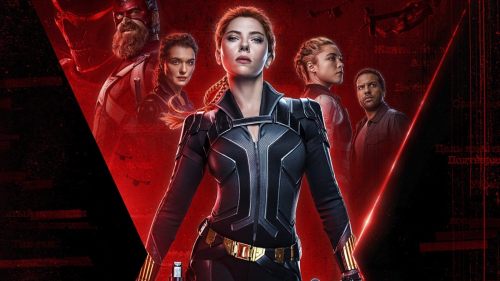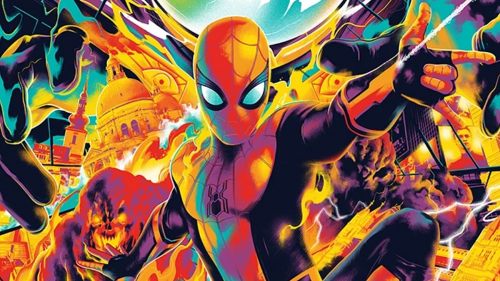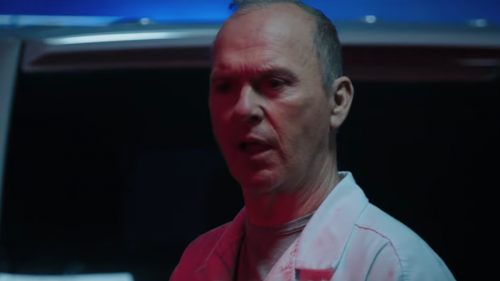SPIDER-MAN: FAR FROM HOME - Mysterio And The Limits of Illusion
*Full Spoilers for Spider-Man: Far From Home and the rest of the MCU below*
With Spider-Man: Far From Home, we got our first cinematic take on one of Spider-Man’s oldest nemeses, Quentin Beck a.k.a. Mysterio. His portrayal is pretty clever (with no small help from Jake Gyllenhaal’s brilliant performance) as the film adapts the character’s classic repertoire of illusions by making his entire persona an illusion up until the third act.
In Far From Home, Mysterio is introduced as a superhero from the greater multiverse. Beck is fighting to save our world (labelled Earth-616 in a nod to the comics) from The Elementals, titanic behemoths who destroyed his home world. Beck flies into action scenes zapping lasers at the enemy, reminiscent of other heroes Peter has met, but most specifically Tony Stark, whose absence is most felt in this post-Endgame Marvel Cinematic Universe. Of course, this film being about Mysterio, everything from the Elementals to the multiverse to Beck’s overdesigned super-suit turns out to be part of an illusion meant to win unlimited access to Tony Stark’s tech division and all the wealth and fame that entails.
When the film reveals that Beck’s heroism is a carefully crafted sham, it also reveals a startling amount of self-awareness on Marvel’s part. Gyllenhaal’s Beck can’t help but spell it out: The MCU has become so numb to planet-shaking crises that one only needs to show up at the right time in a colorful costume to win the trust and adoration of the masses. He even takes aim at Tony Stark himself—the MCU’s gold-titanium messiah—to make the point that even an egotistical man-child can be worshipped to near-sainthood if he puts on a costume and shoots lasers at a big enough monster. (He’s not wrong.)
The Beck reveal and several other moments throughout the film make it seem like Marvel is using Spider-Man: Far From Home—their first film following the gargantuan climax of Avengers: Endgame—to finally acknowledge some of their more tired story patterns. The steady encroachment of mind-boggling, impersonal stakes. (“People will believe anything!” Beck observes.) Heroes gaining immense access to power with no qualifications or oversight. (Is Beck wrong to be concerned about a 16-year-old owning an army of killer spy drones?) The way the MCU has grown eyeroll-inducingly Stark-centric. (EDITH’s namesake, “Even Dead I’m The Hero”, initially seems to be a jab at this.)
So with all the self-awareness on display in Far From Home, one would assume that the movie is attempting a deconstruction. That wouldn’t inherently be the wrong approach, because in the process, Far From Home could then reconstruct a new identity for both the Spider-Man movies (following Into The Spider-Verse’s throwing down of the gauntlet) and the post-Iron Man, post-Infinity Saga MCU.
But frustratingly, Spider-Man: Far From Home isn’t that interested in paving a new way forward. The film isn’t interested in anything more than lampshading its clichés so it can create the illusion that it’s doing something different without actually doing something different. That’s the real grand illusion of Far From Home, and it isn’t even one of Quentin Beck’s creations.
After the Mysterio reveal—where Beck opines about the subtle injustices of a world so preoccupied with super saviors—the film fails to examine Beck’s points in any meaningful way. In the end, Peter Parker gets everything he wants—including the title of “the next Tony Stark”—not through any sacrifice or personal growth, but because he’s simply a Good Ol’ Boy with superpowers. It kind of validates Mysterio’s style-over-substance shortcuts, because those are the same means through which Peter succeeds in the film. (And do I really need to explain how perverse it is that Spider-Man, a character who’s traditionally informed by the staid reliability of Uncle Ben, is now being sold to us as Tony Stark’s one true successor?)
The commentary about people being gullible enough to see faceless CG creations and believing them to be real threats reads as very cynical when you consider the film’s climax; it pits the heroes against an army of faceless CG creations that we, the audience, are expected to believe are threatening. And for all the excitement J.K. Simmons’s appearance in the mid-credits scene generated, I can’t expect them to do something with that revelation after Far From Home pretty much ignored Homecoming’s Aunt May discovery. In what world would May Parker be a “cool mom” about her nephew being an Avenger after 1) two high-profile Avengers were just killed in action and 2) she and her nephew disappeared from existence for the past five years?
As a Thor: The Dark World apologist, I hope it’s understood that I’m not writing to be harsh for harshness’s sake. I’m writing because I’m concerned that—after the unprecedented success of Black Panther and all the excitement of the Infinity Saga—the MCU has maybe found itself in a rut. After all, how many times can you tell a story about finding your inner hero before getting tired of it? How many times can you ratchet up the world-threatening stakes before things start to become less interesting instead of more? A 23-film success streak like this is unprecedented, and as much as I hate the term “superhero fatigue”, that’s still a thing that Marvel Studios consciously has to deal with, not to retain audiences necessarily, but to keep their creators invested. I think that type of creative fatigue is the reason why Spider-Man: Far From Home is such a weirdly self-conscious, unambitious film.
The way Marvel Comics has historically gotten around creative fatigue is by seeing their superhero stories as more than superhero stories. They’ve committed to genre fusions with horror, comedy, satire, the avant-garde, etcetera. That’s how you get Kraven’s Last Hunt, or an issue of Hawkeye that’s entirely from the point of view of a dog’s nose. While Marvel Studios has occasionally experimented with other genres and structures, it’s undeniable that their main template is still the first Iron Man movie. Why else would Spider-Man: Far From Home be so preoccupied with reenacting that movie’s story beats, down to the third act villain reveal, the AC/DC needle drop, and the last-second unmasking?
I’m guessing that Marvel themselves recognizes this is an issue, yet even after blowing (or Disney buying) all of the competition out of the water, they’re still scared of breaking from the Iron Man formula. Captain Marvel had the makings of a structurally and thematically unique Marvel film, but it got bogged down by perfunctory Tony Stark-isms like the need to cap every seen with a quippy line or camera wink.
Seeing how MCU movies basically sell themselves, the Infinity Saga is officially over, and the company is now merging with the studio that made Logan, there’s no reason why Marvel Studios shouldn’t be a little bolder with their new films. Like, why couldn’t Far From Home be told entirely through vignettes, one for each European country? Or how about a nonlinear Doctor Strange film? Or a le Carré-esque, super ambiguous Black Widow thriller? Quentin Beck said, “People will believe anything!” but “anything” doesn’t have to be limited to what flavor of science-fiction you use to coat your faceless CGI menace. Why don’t you let “anything” really mean anything?



